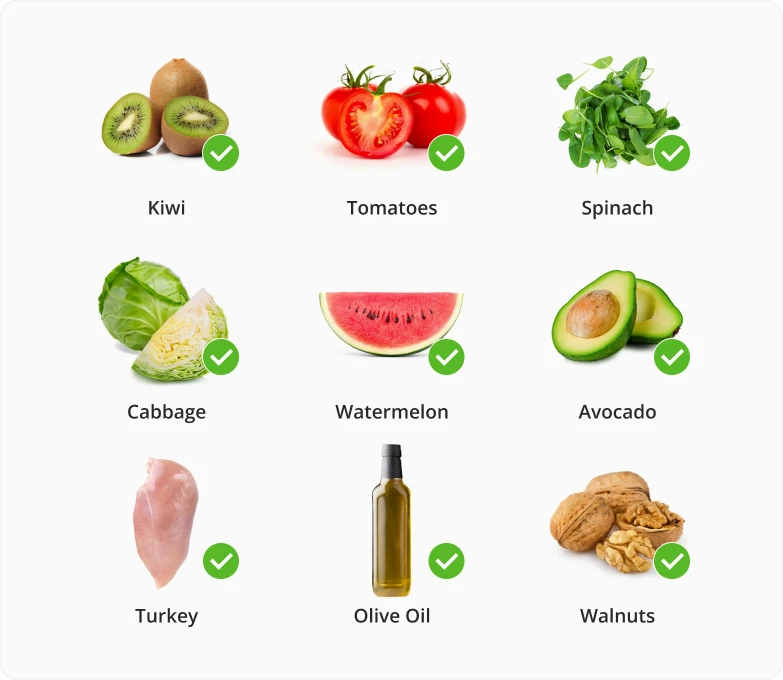In a world where health concerns are rising and chronic diseases are becoming more prevalent, many people are looking for natural and sustainable ways to take care of their bodies. The good news? Nature has always had the answers. Certain foods are not just delicious—they are powerful allies in maintaining, supporting, and even improving our health.
This article dives deep into six remarkable natural foods that go beyond basic nutrition. These ingredients contain compounds that prevent deficiencies, support recovery, and combat disease. Let’s explore how incorporating these foods into your diet can promote long-term well-being and vitality.
🥬 Spinach for Anemia: Nature’s Iron Booster
Iron-deficiency anemia affects millions of people globally. It results from low levels of iron, causing fatigue, pale skin, and shortness of breath. Thankfully, nature provides a leafy green solution: spinach.
Why Spinach Helps:
-
Rich in iron: Crucial for hemoglobin production in red blood cells.
-
Folate (Vitamin B9): Supports the formation of new cells, including red blood cells.
-
Vitamin C: Enhances iron absorption when consumed together.

How to Use:
Add raw spinach to smoothies or salads, sauté it with garlic, or mix it into soups and stews. For maximum iron absorption, pair it with vitamin C-rich foods like oranges or bell peppers.
🎃 Pumpkin for Arthritis: Anti-Inflammatory Superfood
Pumpkin isn’t just for fall—it’s a year-round superfood with anti-inflammatory properties that can ease symptoms of arthritis.
Why Pumpkin Helps:
-
Beta-carotene: A powerful antioxidant that reduces joint inflammation.
-
Vitamins C & E: Protect cartilage and connective tissue from oxidative damage.

-
Fiber: Aids in overall digestive health, which can help reduce systemic inflammation.
How to Use:
Enjoy roasted pumpkin, blend it into smoothies, or use pureed pumpkin in soups or healthy desserts. Don’t forget the seeds—they’re full of zinc and omega-3s, also beneficial for joint health.
🧄 Garlic for High Blood Pressure: Heart-Healthy Powerhouse
If you’re looking to support healthy blood pressure levels naturally, garlic should be a staple in your kitchen.
Why Garlic Helps:
-
Allicin, the active compound in fresh garlic, relaxes blood vessels and improves circulation.
-
Garlic has been shown to lower systolic and diastolic blood pressure in individuals with hypertension.
-
Its natural antibacterial and anti-inflammatory properties support overall cardiovascular health.
How to Use:
Crush or chop fresh garlic and let it sit for a few minutes before cooking—this activates the allicin. Add it to salads, soups, stir-fries, or even consume raw for maximum benefits.
🥛 Milk for Osteoporosis: Building Stronger Bones
Bone health becomes increasingly important with age, and osteoporosis—a condition where bones become brittle—affects millions worldwide. Fortunately, milk remains one of the best dietary sources of calcium and Vitamin D, two nutrients essential for bone strength.
Why Milk Helps:
-
Calcium is the primary mineral in bones and teeth.
-
Vitamin D aids in calcium absorption and bone regeneration.
-
Regular intake supports bone density and reduces fracture risk.
How to Use:
Incorporate milk into your daily routine through smoothies, oatmeal, or simply as a beverage. For those who are lactose intolerant, look for calcium-fortified plant-based alternatives like almond or soy milk.
🫒 Olives for Atherosclerosis: Protecting Arterial Health
Atherosclerosis, the hardening and narrowing of arteries due to plaque buildup, is a leading cause of heart disease. But the Mediterranean diet offers a delicious remedy—olives.
Why Olives Help:
-
Monounsaturated fats (especially in olive oil) help reduce LDL (bad) cholesterol levels.
-
Polyphenols in olives have strong anti-inflammatory and antioxidant effects, protecting artery walls.
-
Regular consumption has been linked to lower risk of cardiovascular disease and better heart function.
How to Use:
Snack on green or black olives, drizzle extra virgin olive oil over salads, or use it as a healthy cooking fat. Choose cold-pressed, unrefined oils for maximum nutritional benefit.
✅ SEO Keywords: olives for heart health, natural remedy for atherosclerosis, monounsaturated fat foods
Bonus Tips: Maximizing the Impact of Natural Foods
To truly unlock the benefits of these healing foods, consistency and combination are key. Here are a few tips to make the most of nature’s bounty:
-
Eat seasonally: Fresh produce in season contains more nutrients and flavor.
-
Pair smartly: Combine iron-rich foods with vitamin C sources for better absorption (e.g., spinach + lemon juice).
-
Choose whole foods: Avoid overly processed versions that may lose their health benefits.
-
Hydrate well: Water supports nutrient transport and detoxification.
-
Listen to your body: Everyone reacts differently; observe what foods make you feel your best.
Natural Nutrition: A Preventive Approach to Wellness
The modern medical world often focuses on treatment, but prevention is the real key to long-term wellness. Incorporating natural, nutrient-dense foods into your diet can help prevent chronic diseases, manage symptoms, and even reduce dependency on medications.
Best of all, these foods are widely available, affordable, and easy to prepare. You don’t need exotic ingredients or expensive supplements to care for your health. Sometimes, the most powerful medicine is already on your plate.
Final Thoughts: Eat with Purpose, Live with Energy
Caring for your health doesn’t have to mean making drastic changes. Start small. Add more spinach to your meals. Replace processed snacks with olives. Use garlic to flavor instead of salt. Each choice adds up—and each natural food brings you closer to better health.
In the end, food isn’t just fuel—it’s nourishment, healing, and care. By eating intentionally and embracing the gifts of nature, you give your body the support it needs to thrive.
So next time you reach for something to eat, ask yourself: Is this food helping me care for myself?
Because with the right choices, your health can truly start in the kitchen.
